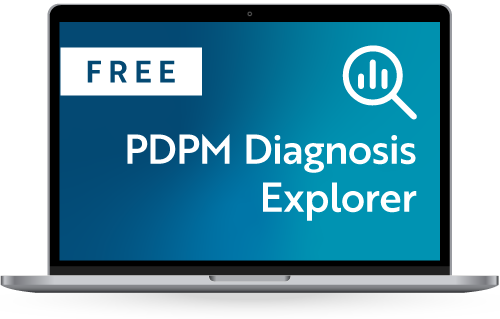SimpleLTC recently worked with the Texas Department of Aging and Disability Services (DADS) and the Texas Medicaid Coalition to present two webinars covering the upcoming Oct. 1 changes to MDS 3.0, including Section GG. You can watch the recording here. (Note: The information is applicable to all states, not just Texas.)
Each training session drew hundreds of participants, showing there’s a strong sense of anxiety regarding the latest MDS changes from CMS. We received dozens of detailed questions during the webinars, but were unable to cover them due to time limitations. So we’ve worked with our presenter to get answers to all of them.
You can read the FAQ below, or download a printable version. Thanks to Shelly Nanney, MDS Clinical Coordinator for the State of Texas, for her work in getting this information out to providers all across the country!
FAQ: Section GG Webinar
Prepared by: Shelly Nanney, MDS Clinical Coordinator, State of Texas
Below, find some of the most commonly asked questions from the webinars. I urge you to contact your State RAI Coordinator if you are outside of Texas. If you are within Texas, please contact me at Shelly.Nanney@dads.state.tx.us if you have further questions. Thanks for participating in the webinars!
GG and NPE Assessments
- Regarding the NPE Assessment, is this only for residents that are in a Medicare Part A stay and D/C back to the facility?
Yes, the NPE assessment is designed to capture what happens to a skilled resident after the “acute” stay. If a resident is Skilled and they then discharge back to a non-skilled level of care, the NPE is required. This is only for residents who are in a skilled level of care.
- If a resident is Skilled under an HMO or Managed Care plan, do we do sections GG and the NPE discharge assessment? Do we submit these?
Each Managed Care Organization or HMO is different. It is up to the facility to ask that question when they admit a resident to a skilled stay. If they do want these assessments completed, they will not be submitted, just like all other HMO/MCO assessments.
- Do we need to modify assessments completed before October 1, 2016?
No, modification is not necessary. Only assessments completed October 1, 2016 or later are affected.
- What if a resident is skilled for nursing only? How do we do a functional assessment?
I know this is uncomfortable for nurses to think about, but we have been doing functional assessments all along. If you read the RAI related to section GG, you will see that the questions are actually very easy to understand. The purpose of this section is to determine the resident’s usual status. If the resident is unable to answer those questions, ask a family member or caregiver. You also need to interview your staff as to the resident’s performance during the look-back period.
- If GG is missed or incomplete can this affect Medicare reimbursement?
GG does not impact your RUG score for that assessment period. But it can impact your overall reimbursement when your rates are set for the next reimbursement cycle. They are stating that any failure to complete QM data items can reduce your overall reimbursement by 2%.
- If a resident discharges from Skilled Services, even though the facility and therapy don’t feel they are ready for discharge, is this a planned or unplanned DC and do we have to do the NPE assessment?
It depends. If you completed planning for Part B services or restorative care, if the physician gave approval and if plans are made for follow-up care, then I would count that as planned. But, if the resident says, I’m leaving and you didn’t make any arrangements for post-skilled stay then that would be unplanned. Any planned discharge from SNF services that results in that resident discharging to the facility will require the NPE assessment. Remember, the goal is to track the resident following a skilled stay.
- There is a mention of students being excluded in the Helper category…does this also exclude therapy students?
No, they will be included in the helper category. This is a general rule as this is allowed under normal facility operations and is standard practice for therapy services.
- If a resident is Long Term and discharges to the hospital and comes back Part A, is section GG required?
Yes, this applies to all Medicare Part A admissions regardless of the location prior to admission. (Again, check with HMO/MCO regarding their preferences.)
- If a resident only stays 5 days how do I complete section GG? What if they admit on a Friday and Discharge on Monday? How am I supposed to get this information?
As long as resident stays at least two days in a skilled stay, then you will complete Section GG. If you look at the RAI page GG-9, it gives you some great examples of how to ask probing questions of your staff to get the answers you need to answer Section GG. Like I said in the webinar, it is probably a good idea to educate your staff on this new terminology so that you can get them familiar with the questions you might ask. This new section is going to require the MDSC to become comfortable with assessing the residents. There are no recommended forms for tracking this information. I’m sure someone will develop one, but at this time the assessment encourages direct observation, interview and assessment.
- Is GG only required with the 5-day assessment?
GG will be required for each skilled admission (5-day), readmission 5-day, and with any planned discharge.
- How do you determine Discharge goals? What if the resident and family’s goals are realistic? What if nursing doesn’t agree with therapies goals?
Per the RAI on Page GG 10-12, there are excellent examples of how to determine Discharge goals. The RAI states: Licensed clinicians can establish a resident’s discharge goal(s) at the time of admission based on the 5-Day PPS assessment, discussions with the resident and family, professional judgment, and the professional’s standard of practice. Goals should be established as part of the resident’s care plan.
- If a resident discharges from Part A and admits to LTC and then decides to go home two days later, why do I have to complete the NPE? Why not just the DC Return Not Anticipated assessment?
The purpose of the NPE is to track the resident from an acute stay (skilled) to a non-skilled level of care. If they discharge to the facility and then decide to go home, the rules for completing a regular discharge assessment do not change. Both would be required.
Pressure Ulcers
- If a resident returns from the hospital with a worsened pressure ulcer than they discharged with, how do we code that?
If the original pressure ulcer is a Stage II and was present on admission, but it worsened in the hospital to a stage III, you still have a Present on admission but now you would code at the higher stage upon their return.
- What if there is a change in size but no change in the stage, can I code this as community required?
No, it was still acquired in your facility; but, you would record the new sizing as per the RAI instructions.
Diagnosis and Psychoactive Medications
- If the physician signs off on the MAR with the DX justifying the medications, would this be enough documentation to support the medication?
Most likely not, there will need to be documentation to support the diagnosis. This can come from the physician’s records, History and Physical or hospital records. Just adding a diagnosis to the MAR with a physician signature may not be enough to substantiate the need for the medication.
- How is Schizophrenia considered a payment item? How can this impact reimbursement?
Schizophrenia as a diagnosis alone is not necessarily a payment item. Where it does figure into reimbursement is when there are behaviors that are attributed to that diagnosis in justification of a medication. For example: you have an 80-year-old resident who is having combative type behaviors and resisting care. You notify the physician, who orders Seroquel. The classification for this medication is an antipsychotic typically used to treat schizophrenia. So, the diagnosis is added for Schizophrenia; this is how it becomes a payment item. It is highly unlikely, however, that an 80-year-old would have a new diagnosis of schizophrenia. The behaviors are likely coming from another source or stimuli. But, you now have this diagnosis on your record and there is not an appropriate diagnosis for this medication and/or the behaviors, so you are likely to face recoupment of the RUG score associated with the behaviors and this diagnosis.
Thanks for your great questions! This just demonstrates what great professionals are in long-term care!
Shelly Nanney, RN, RAC-CT MDS Clinical Coordinator, State of Texas
Shelly.Nanney@dads.state.tx.us
Office: 979-732-8507
Cell: 512-534-1325




22 Comments on “Answers to your top Section GG and MDS 3.0 questions”
Please send a link to sign up for web training for GG on Sept 16. Went to web site that was listed at training for RAI manual update just now attended and there is nothing there to register.
Thank you,
Karen Whisenhunt, RN
MDSDirector@minecreekhc.com
Hi Karen — You can register for the Section GG webinar here: https://www.simpleltc.com/webinar-mds-3-0-section-gg-completion-coding-requirements/
This is very good information, especially for people like me who have no experience in this field. I thank you
Thanks so much! We’re glad the webinar was helpful…look for more educational sessions coming in the future.
Is section GG required for 5 day MDS’s admitted before 10/1/16 like if admitted on 9/28/16?
Hi Lisa — Per our Section GG webinar presenter: “Any assessment with an ARD of 10/1 or later will have Section GG active. So it will either need to be completed or dashed out in order to close the assessment. If the organization has the information, I would complete it. If not they can dash. The resident would not be used in the QRP since they were admitted prior to 10/1 thus no negative impact for dashing.”
if a resident started their medicare stay in july and section gg was not required at that time do you still need to complete medicare discharge being there is no discharge goals
Hi Kathleen. Per our Section GG webinar presenter: “CMS has clarified that if the person was admitted prior to 10/1 and discharges after 10/1, you should still complete a SNF Part A Discharge assessment however Section GG can be dashed without penalty.”
We have several people covered by private insurances who require RUG scores for their billing. Can we combine an OBRA MDS with an MDS required for private insurance billing? For example, Today’s Options requires the PPS schedule. Can we combine the 5-day for Today’s Options and an admission MDS?
Hi Terry — I posed your questions to one of our clinicians at Briggs Healthcare. Here’s her answer…
“You can combine the OBRA with the PPS (for payment) but you should NOT submit this combined review to QIES ASAP – the Federal Repository. CMS has given direction that ONLY traditional Medicare A skilled stay PPS assessments may submitted to the Repository. The question posed is in reference to private insurances, so the MDS for skilled reimbursement should not be combined with the OBRA-required assessments.
From Chapter 5, Page 5-1 of the October 2016 of the Long-Term Care Facility Resident Assessment Instrument 3.0 User’s Manual – 3rd sentence beneath 5.1…
Some EMR vendors allow the user to encode a PPS assessment, then mark it as Complete, which keeps it out of a submission file. If Today’s Options allows something like this, the user could encode the PPS-payment only assessment separately from the OBRA-required assessment in this scenario. Also, if Today’s Options allows the user to push the data from one assessment to another, this would allow the user to start either the PPS or the OBRA then copy the data into the other reason for assessment. This would reduce additional data entry into the ‘second’ record. Transmit only the OBRA in this scenario. Retain the PPS assessment for RUG reporting to the private insurance company but do not transmit the PPS assessment to CMS.”
Snf doing functional assessments daily for 3 days. Is this required,? My understanding is once in that time frame
Hi Heather — We reached out to one of our clinical experts at Briggs Healthcare for this. She recommends reviewing what the current RAI Manual says about those 3 days (Chapter 3, Page GG-2):
And from Chapter 3, Page GG-4:
Note that in the above the CMS directives include the assessment occurring PRIOR TO the start of therapies so there will be cases when there is only assessment that can be made as therapies generally start fairly quickly after admission, unless the admission occurs on a weekend or holiday. Everyone should carefully review Section GG of the RAI Manual for specific directions.
Totally awesome site. I just found you. Plan to come back frequently.
Thanks, Val! Glad you found the content helpful.
Are GG admit and discharge goals done on skilled insurance resident in LTC
Per our clinical expert at Briggs Healthcare, the short answer is no. You would only complete GG if the resident is in a traditional Part A Medicare stay or ending a traditional Part A Medicare stay.
Is it ok to backdate a GG to before the eval was done in other to capture the 3day assessments window? Or is the rule for the gg to be done on the same day as the eval?
Good afternoon, please contact the state RAI coordinator at susan.edgeman@hhsc.state.tx.us. Thanks!
Question. What are the MDS Coordinators expected to do with the Assessments already being addressed as the regular 5, 14, 30, 60, 90 days Assessment, as of 10/1/19?
Hi Jean, MDS coordinators will not be able to even create a “14 day assessment” after 10/1/19. The only part A assessments they will be able to create are 5-day, Discharge, and IPA assessments. Thanks!
I had a resident that had a qualifying stay then was sent home, was sent back to the ER immediately, then was admitted to us. Is that a hospital admit or a community admit?
Hi Jennifer: We’re unable to answer clinical questions here on the website. Please contact your clinical supervisor for assistance. Thanks!